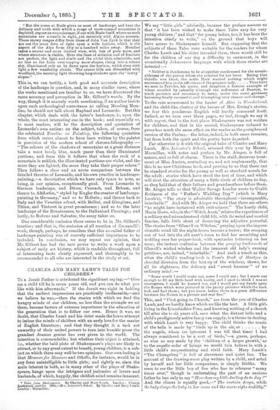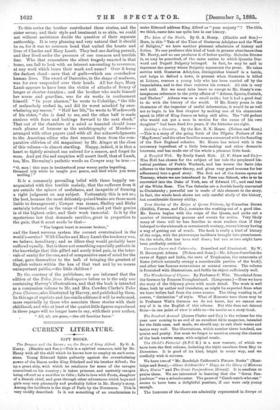CHARLES AND MARY LAMB'S TALES FOR CHILDREN.* To a Jesuit
Father is attributed the significant saying,—" Give me a child till he is seven years old, and you can do what you like with him afterwards." If the Jesuit was right in holding that the earliest impressions are practically ineffaceable,—and we believe he was,—then the stories with which we feed the hungry minds of our children, no less than the example we set them, become factors of extreme importance in the education of the generation that is to follow our own. Hence it was, no doubt, that Charles Lamb and his sister made the brave attempt to imbue the minds of children with an early love for the master of English literature ; and that they thought it a task not unworthy of their united powers to turn into bumble prose the grandest dramas genius has ever given to the world. The intention is commendable; but whether their object is attained, i.e., whether the bald plots of Shakespeare's plays are likely to attract, or to any great extent to benefit, young children, is a sub- ject on which there may well be two opinions. Our own feeling is that Measure for Measure and Othello, for instance, would be in any form unintelligible to little girls; and rightly so, since the main interest in both, as in many other of the plays of Shake- speare, hangs upon the intrigues and jealousies of lovers and husbands, of which, happily, the childish mind remains innocent.
* Tales from Shakespeare. By Charles and Mary Limb. London: Crosby, Lookwood, and Co. 1885.—Mrs. Leicester's &Moot. By Charles and Mary Iamb. London : Macmillan.
We say "little girls" advisedly, because the preface assures us that "it has been wished to make these Tales easy for very young children ;" and that" for young ladies, too, it has been the intention chiefly to write," on the ground that boys will have access to Shakespeare himself. But supposing that the subjects of these Tales were suitable for the readers for whom Charles Lamb and his sister intended them, there would still be for the children of our day a difficulty to surmount, in the occasionally Johnsonese language with which these stories are invested :—
"Neither is Desdemona to be altogether condemned for the unsuit- ableness of the person whom she selected for her lover. Bating that Othello was black, the noble Moor wanted nothing which might
recommend him to the affections of the greatest lady. Thus have we seen in Pericles, his queen, and daughter, a famous example of virtue assailed by calamity (through the sufferance of Heaven, to teach patience and constancy to men), under the same guidance becoming finally successful, and triumphing over chance and change."
To the ears accustomed to the banter of Alice in Wonderland, and the child-like chatter of the heroes of Mrs. Ewing's stories, we fear this ponderous English will hardly commend itself. Indeed, as we turn over these pages, we feel, though we say it with regret, that in the first place Shakespeare was not written for children, and that in the second, Shakespeare reduced to prose has much the same effect on the reader as the paraphrased version of the Psalms,—the letter, indeed, in both cases remains, but from both the spirit and the poetry have departed.
Far otherwise is it with the original tales of Charles and Mary Lamb. Mrs. Leicester's School, reissued this year by Messrs. Macmillan, with notes and preface by Mr. Ainger, is full of nature, and so full of charm. There is the staid, decorous treat- ment of Miss Austen, reminding us, and not unpleasantly, that this is no new Christmas hook, and proving to us that there can be standard stories for the young as well as standard novels for the adult ; stories which have stood the test of time, and which will rivet the attention of many a little circle of children to-day, as they held that of their fathers and grandmothers before them. Mr. Ainger tells us that Walter Savage Lander wrote to Crabb Robinson of the "Father's Wedding Day" (which is Mary Lamb's), "The story is admirable throughout—incomparable, inimitable!" And with Mr. Ainger we hold that there are others "be might have instanced with enthusiasm." The lonely child, Maria Howe, who,in the "Witch Aunt," relates the experiences of a solitary and misunderstood child-life, with its weird and morbid fancies, falls little short of deserving the adjective powerful.
The stories from "Glanvil on Witches," preying upon the impres- sionable mind till the night-hours become a terror; the creeping out of bed into the old aunt's room to find her mumbling and nodding over her prayer-book, with spectacles tottering on her nose; the instant confusion between the praying backwards of Glanvil's wicked witches and the innocent old lady's evening petitions, are, indeed, "inimitable." And such a touch as this, when the child's reading-book is Foxe's Book of Martyrs (a cheerful diversion from the history of the witches), shows, for all its slightness, the delicacy and "sweet humour" of no ordinary mind :—
"Some words I could make out, some I could not ; but I made out enough to fill my little head with vanity, and I used to think I was so courageous, I could be burned too, and I would put my hands upon the flames which were pictured in the pretty pictures which the book had, and feel them; but you know, ladies, there is a great difference between the flames in a picture and real fire."
This, and "First going to Church," are from the pen of Charles Lamb, and we hardly know which we like the best. A little girl, living in the Lincolnshire Fens, and knowing nothing of a church till after she is six years old, save what the distant bells and a child's prodigiously active fancy can supply, is a theme in dealing with which Lamb is very happy. The child thinks the music of the bells is made by "birds up in the air, or by the angels, whom (so ignorant I was till that time) I had always considered to be a sort of birds,"—a guess, perhaps, as wise as any made by the 'children of a larger growth,' as to the angelic order of beings we would fain believe in with a little child's unquestioning and vivid faith. Mary Lamb's "The Changeling" is full of cleverness and quiet fun. The account of the drawing-room play written by a child, and acted by herself and her little companions, is simply lifelike. We seem to see the little boy of five who has to rehearse "many times over," though in undertaking the part of an anxious father he has only to say "How does my little darling do to day ?" And the climax is equally good,—" The curtain drops, while the lady clasps the baby in her arms and the nurse sighs audibly."
To this seriea the brother contributed three stories, and the sister seven; and their style and treatment is so akin, we could not without assistance decide the question of their separate authorship. It is very pleasing and very natural that it should be so, for it was no common bond that -united the hearts and lives of Charles and Mary Lamb. They had one darling pursuit, and they lived under the pressure of one common and terrible fear. Who that remembers the silent tragedy enacted in that home, can fail to look with an interest amounting to reverence, at any work which bears their mark and name? Over it hung the darkest cloud—save that of guilt—which can overshadow human lives. The sword of Damocles, in the shape of madness, was for ever suspended over their heads. All her days, Mary Lamb appears to have been the victim of attacks of frenzy of longer or shorter duration ; and the brother who made himself her nurse and guardian, was for six weeks in confinement himself. "In your absence," he wrote to Coleridge, "the tide of melancholy rushed in, and did its worst mischief by over- whelming my reason." "Half her life," he wrote to Wordsworth of his sister, "she is dead to me, and the other half is made anxious with fears and lookings forward to the next shock." That out of the chambers of a mind so haunted should issue such gleams of humour as the autobiography of Minden— arranged with other papers (and with all due acknowledgments to the American editor who first rescued them from the com- parative oblivion of old magazines) by Mr. Ainger at the close of this volume—is almost startling. Happy, indeed, it is that a heart so tightly strained can unbend for a season, and forget its woes. And yet the sad suspicion will assert itself, that of Lamb, too, Mrs. Browning's pathetic words on Cowper may be true :— "0, men ! this man in brotherhood your weary paths beguiling, Groaned inly while he taught you peace, and died while you were smiling!"
it is a commonly prevailing belief with those happily un- acquainted with this terrible malady, that the sufferers from it are outside the sphere of usefulness, and incapable of forming a right judgment on any subject. Fortunately this is not so ; the best, because the most delicately-poised brains are those most liable to derangement ; Cowper was insane, Shelley and Blake oestainly tottered on the verge of insanity, and yet their genius is of the highest order, and their work immortal. Is it by the mysterious law that demands sacrifice, great in proportion to the gain, that it must needs be that- " The largest heart is soonest broken,"
and the finest nervous system the soonest overstrained in the world's-service? With Charles and Mary Lamb the tendency was, we believe, hereditary; and as idlers they would probably have suffered equally. But is there not something especially pathetic in the knowledge that this gifted and sorely tried pair, in the inter- vals of sanity for the one, and of comparative ease of mind for the other, gave themselves to the tadk of bringing the greatest of English writers within the ken of that vast and by no means unimportant public,—the little children ?
By the courtesy of the publishers, we are informed that the edition of the Tales front Shakespeare before as is the only one containing Harvey's illustrations, and that the book is intended as a companion volume to Mr. and Mrs. Cowden Clarke's Tales from, Chaucer, also illustrated by Harvey, and published by them. In this age of reprints and fac-simile editions it will be welcomed, more especially by those who associate these stories with their childhood, and who at least of the quaint little figures reproduced in these pages will no longer have to say, with their poor author, "All, all, are gone,—the old familiar faces."







































 Previous page
Previous page